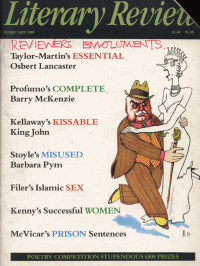Kieran Fogarty
Fed Up with Being Alienated
American Journals
By Albert Camus
Hamish Hamilton 157pp £12.95
Short and fragmented, these are the notebooks of two journeys made by Camus to the United States and Canada in 1946, and to South America in 1949. Forty years later, those dates seem more or less consecutive – but in the context of Camus’s career and increasingly desperate disillusion, the three years seem more like ten. You come to the book gleefully, armed with the hindsight of knowing the author to be enshrined in literary history expecting him to rip into the spiritual cote of the new world with much of traditional prejudice of the old; and you are stopped cold by a writer much younger than history remembers him, locked in struggle for his own soul.
This makes Camus’s initial collision with New York imaginatively awesome. Leaving France, his last image ‘is destroyed buildings at the very edge of wounded earth’. A few days later ‘crossing Broadway in a taxi, tired and feverish. I am literally stupefied by the circus lights. I am just coming out

Sign Up to our newsletter
Receive free articles, highlights from the archive, news, details of prizes, and much more.@Lit_Review
Follow Literary Review on Twitter
Twitter Feed
Few writers have been so eagerly mythologised as Katherine Mansfield. The short, brilliant life, the doomed love affairs, the sickly genius have together blurred the woman behind the work.
Sophie Oliver looks to Mansfield's stories for answers.
Sophie Oliver - Restless Soul
Sophie Oliver: Restless Soul - Katherine Mansfield: A Hidden Life by Gerri Kimber
literaryreview.co.uk
Literary Review is seeking an editorial intern.
Though Jean-Michel Basquiat was a sensation in his lifetime, it was thirty years after his death that one of his pieces fetched a record price of $110.5 million.
Stephen Smith explores the artist's starry afterlife.
Stephen Smith - Paint Fast, Die Young
Stephen Smith: Paint Fast, Die Young - Jean-Michel Basquiat: The Making of an Icon by Doug Woodham
literaryreview.co.uk